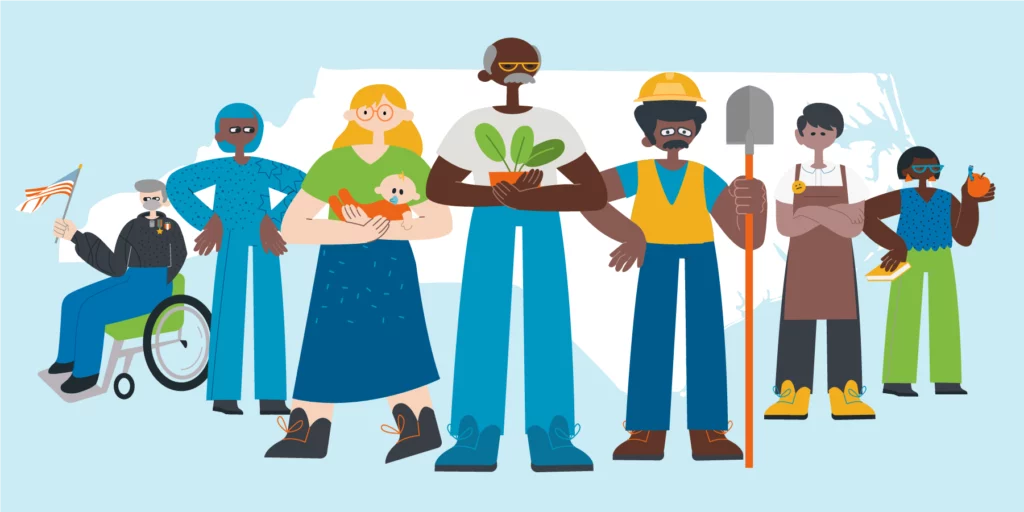
NC can choose good property tax policies that support affordable housing
In cities and counties across North Carolina, we all want stable and affordable housing for our families, along with trustworthy and reliable public services. Property taxes are one of the ways that we come together to fund local services that we all rely on: things like school buildings for our children, health and fire departments, and parks. Homeowners and renters all contribute to property taxes; homeowners pay taxes directly while renters pay them indirectly through rent payments.
But our current property tax system can lead to housing displacement and perpetuate inequities, especially when a shortage of affordable housing is driving rapid increases in housing prices. Fortunately, North Carolina can adopt good policies to make the system fairer and support housing affordability without jeopardizing our public services. While we advocate for effective policies, we also need to watch out for some politicians and anti-government extremists who try to use property taxes as a wedge to push damaging property tax caps as part of an agenda to make government less effective.
Rapid increases in property taxes can lead to displacement and worsen racial inequities
Residential property taxes are based on a percent of a home’s appraised value, and in North Carolina homes are appraised every 4 to 8 years. When housing costs are rising rapidly — as they are across the state and especially in urban areas — a new appraisal can lead to a sudden jump in payments, especially for people living in homes with relatively low values. For example, when Mecklenburg County conducted its last property reevaluation in 2019, over 23,000 property owners saw their bills increase by over $100 a month.
Abrupt increases can contribute to financial instability and increase displacement pressures in gentrifying neighborhoods where housing costs have historically been lower. Our property tax system also contributes to racial inequities, in part because a long history of racist housing policy and segregation that means that Black people disproportionately live in lower-value homes that tend to be overvalued for tax assessment purposes. (This happens even as private appraisals used for securing loans regularly undervalue their homes, worsening the racial wealth gap.) Inequitable assessments lead to Black and Latino homeowners paying more for the same public services than their white counterparts. Black and Latino homeowners are also less likely to appeal property tax assessments and less likely to win their appeals if they do. Rising property taxes can also make it harder for older people to age in place if they are “house rich, cash poor,” with a lot of equity in their homes but with very low and/or fixed incomes.
Effective property tax relief targets people who need it while keeping local services funded
At the same time, property taxes are the main source of revenue for cities and counties, and we need to address the inequitable property tax system while maintaining the public funds we need to support our communities. North Carolina has three existing property tax relief programs that reduce the taxable value of homes or allow people to defer tax payments, but they are only available to an extremely limited number of people. To qualify, homeowners must be elderly and/or have a disability and meet very restrictive income requirements, or be veterans with disabilities. These programs also don’t provide any support to local governments to make up for lost revenue.
The most effective and equitable property tax relief would:
- Target households with low incomes who pay the highest percent of their income in property taxes, but without setting income limits so low that too few people are eligible
- Provide adequate benefits that adjust with inflation
- Use state funding to prevent local revenue loss that harms public services
- Be easy to administer and reach as many eligible people as possible through sufficient outreach
- Provide both renters and homeowners with support
Well-designed property tax circuit breakers can hit all these targets. These policies are called “circuit breakers” because they prevent tax “overload” if property tax costs rise above a certain percent of a homeowner’s income, like an electrical circuit breaker protects circuits from electrical overload. For example, in Michigan homeowners with low incomes are eligible for a refundable tax credit that covers a portion of their property tax if their tax payments are over 3.2 percent of their income. Renters are also eligible: The policy considers a percent of rent payments as property taxes to calculate the credit. Maine has a similarly structured policy. Using the state income tax system helps streamline program administration for everyone, as people aren’t required to complete a separate application to verify their eligibility. (A standalone application is available for people who aren’t required to file income taxes.) This structure also avoids any revenue loss for local governments.
Tax deferral policies can also be a good option for people with high-value homes but low incomes, allowing them to defer payments until they sell their home. Because homeowners or their heirs ultimately pay all property taxes, there are no long-term costs to government services. Local governments still need state support to make sure they have enough funding in the short term. Colorado’s state-level property tax deferral program reimburses counties for deferred taxes and then collects the taxes when they are repaid.
Good policies are on the table for North Carolina this legislative session. House Bill 637 would expand North Carolina’s existing circuit breaker program to make it available to all homeowners who meet the income limit ($50,700 in 2022) instead of only to people who are also elderly and disabled. It would also use state funds to reimburse local governments for revenue losses.
Strict property tax caps harm local public services and deepen inequities
North Carolinians would benefit from equitable property tax relief, but we can’t let people with an anti-government agenda gain support for property tax caps that starve our cities and counties of resources. Perhaps the most infamous statewide property tax cap is California’s Proposition 13, which places a strict cap on property tax rates and the amount that assessed value can increase each year under a single owner. Since the 1970s, several states have adopted similar caps, and it’s clear that they are bad policy, resulting in major funding losses for local services, especially for education, without meaningfully addressing housing affordability. Property tax caps don’t just fail to address the problems with the current system — they deepen inequities. Caps on changes in assessed value cause huge and unfair differences in the taxes different homeowners pay on otherwise similar homes, based only on how long they’ve owned them. The greatest benefits of property tax caps tend to accrue to white homeowners who have lived for a long time in very high-value homes.
North Carolinians deserve effective property tax policies that support stable housing, thriving families, and high-quality local resources, and we need to work together to reject tax caps that would harm our communities and advocate for programs that work.



